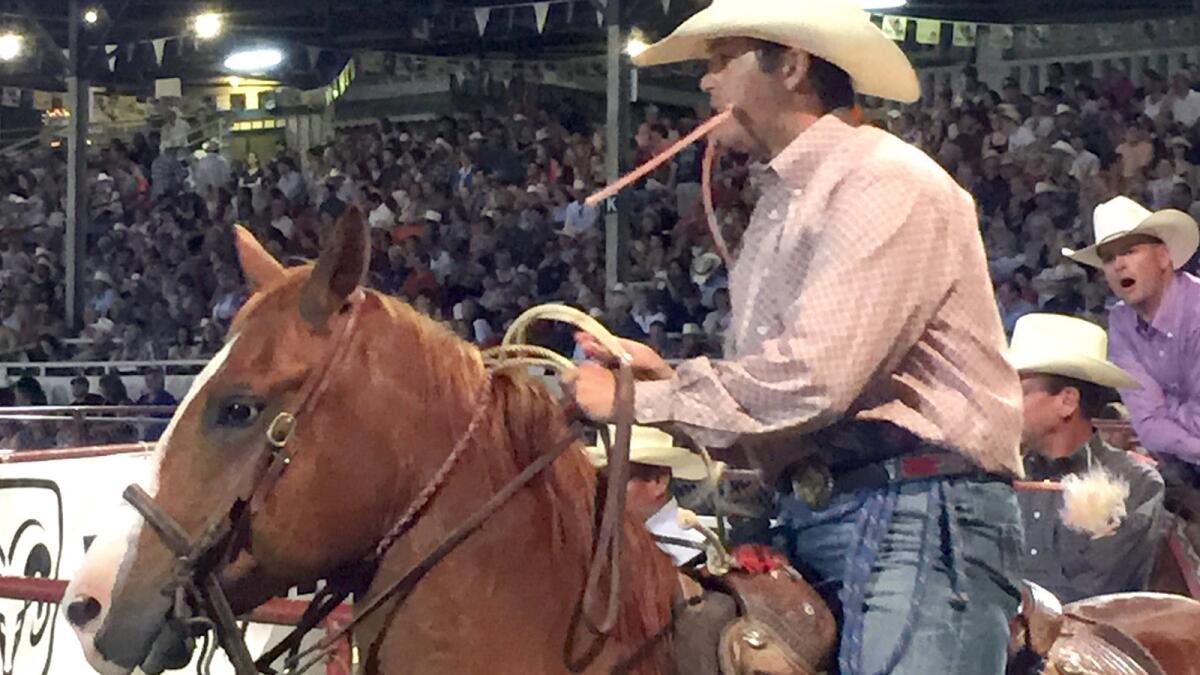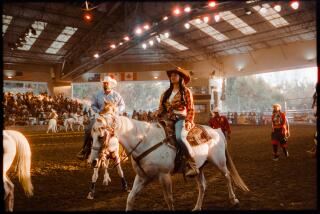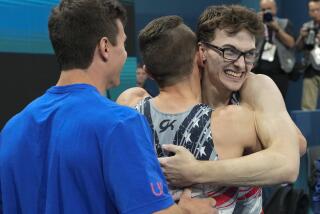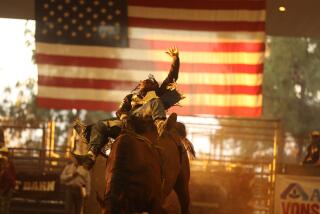Great Read: For a failed bronco, a new rider offers a shot at rodeo redemption

Bryce Runyan and his horse Bruce prepare for competition in Prescott, Ariz.
- Share via
Reporting from Prescott, Ariz. — The horse trotted gingerly out of his silver steel trailer, each step coughing up a puff of dry field dirt. He is 15 hands high with a fine, sinewy frame and a bluish stripe down his nose. He is the beautiful sorrel that just couldn’t win.
In the steamy twilight at the oldest professional rodeo in the nation, the shy horse found himself near the end of his line — not good for work, not fearless enough for the arena.
His last, best chance coaxed him out of the trailer one hour before showtime, a champion calf roper all of 25 years old who looks even younger, with a mop of downy brown hair and a face absent any sarcasm or mirth.
His name is Bryce Runyan. He does not curse. Calls everyone “sir” or “ma’am.” If there’s brown liquid in his cup, it is iced tea.
Runyan swept a comb through the auburn locks of his new partner, who spent most of his life in rodeo as a failed bronco named Bruce.
SIGN UP for the free Great Reads newsletter >>
Perhaps “failed” is too strong a word. But what else to call a horse that was handed over nearly free to a young man from Silver City, N.M.?
Other cowboys “said he couldn’t run how they wanted,” Runyan said. “I saw he could run the way I wanted.”
Bruce wasn’t bold or violent enough for bronco riding, the iconic rodeo event where cowboys try to stay astride a bucking horse.
But Bruce was quick and strong, and he had something those wild-eyed broncos didn’t: He was smart, and in calf roping, a smart horse can win.
Who can say why a team works? It’s not simply a measure of paying for the most talent. Good teammates share some indefinable connection, when magic occurs and the partnership is greater than the sum of its parts. On this June evening in Prescott, Runyan and Bruce would begin to find out if they had it.
Runyan swung a leg over Bruce’s back and they trotted to the rodeo grounds. The sun was setting and girls on horseback in sequined shawls and cowboy hats raced around the arena’s perimeter, waving American flags at a rodeo that dates to 1888.
A clown-car ambulance emerged, its engine smoking. “I couldn’t afford to change the oil with that Obamacare,” the rodeo clown said into the microphone to riotous applause.
Obamacare jokes kill here.
There’s a moment in nearly every rodeo that reveals the first-timers in the crowd. Veteran hands know the moment, relish it, and it comes during calf roping.
A calf sprints into the arena and the newcomers coo and aww. An eye blink later, a mounted cowboy makes a break for the calf, slings his lasso and the calf stops short, the rope around its neck.
If the stop is violent enough, the uninitiated in the crowd will gasp. If they don’t, they will when they see what happens next as the cowboy leaps from his saddle, runs to the calf, lifts it and slams it to the ground, its little legs wiggling in the air. The cowboy then binds three of its legs together with a strip of “piggin’ string.” All in seconds.
It takes practice, hours and hours in a dirt patch somewhere, working on their timing and movement, trying and failing and trying and failing until finally horse and rider move as one. It was like that for Runyan and Bruce’s predecessor, a friendly chestnut named Maverick.
The horse was good, sometimes great, capping his career with a memorable performance in last year’s Prescott rodeo, when Maverick and Runyan won first place and $5,000.
But Maverick was getting older; he’s 13, and worse, he and Runyan had grown too used to each other. This sometimes happens to rodeo horses — they know their riders so well, they over-anticipate the next move, fouling the milliseconds that define who wins and who loses.
So Runyan tried to break in new horses to replace him. There was Katie, who was too slow, and Rob, who just didn’t get it. Then he found Bruce. A sweet horse, said the family who owned him, but no champion.
They weren’t ready to sell the horse, but didn’t want to give him away either, so they offered Runyan a kind of lifetime lease: For a $1,000 down payment, take Bruce and train him, they said, and keep the winnings.
The traits of a calf-roping horse are specific. The horse must have a terrifically quick launch from the gate, timed to the moment the rider tenses his legs. The horse must be able to stop and drop down his rear end immediately to speed the rider’s dismount.
But all of that is easy compared with what comes next. No other sport, anywhere, asks its competitors to leave their conveyances: A NASCAR driver doesn’t hop out of her Chevy SS. When a calf roper leaps off his horse, he’s trusting not just training, but intuition — trusting that the horse understands what’s happening and will react appropriately.
If the horse pulls away too quickly, the calf gets dragged. If he draws closer and lets the rope loosen, a rider is dealing with a few dozen pounds of unrestrained, ticked-off bovine.
A calf roper and his horse must wait to enter the ring behind a wooden barrier. After the calf runs a certain distance, the barrier falls and the rider begins the chase. Sometimes a rider gets too eager and crashes through the barrier, suffering a 10-second penalty.
Tenths of seconds matter: Runyan won last year by roping his first calf in 10 seconds flat. His next-closest competition came in at 10.70.
Runyan sat astride Bruce, chewing the piggin’ string and making long, slow loops with his lasso.
The public address system crackled to life: “Here is your champion from last year, Brrrrrryce Runyan!”
Runyan tipped back his straw hat and held Bruce’s reins taut. As the crowd went quiet, Runyan’s eyes trained forward.
CLANG! The calf spilled out of the gate, loping left, then veering to the center, slackening the line. Runyan couldn’t adjust. He and Bruce blew through the barrier and the crowd groaned.
That was it. A half-second and the show, for Runyan, was over.
“Don’t let him go out like that,” the announcer implored.
The crowd murmured and rustled and eventually mustered respectable applause.
Runyan, his head bowed and hair slick with sweat, lifted his head, pulled up his hat and nodded, then rode Bruce through a cluster of horse trailers.
Runyan thinks of growing up and leaving rodeo some day. He envisions marrying his girlfriend and ending a life that’s kept him on the road for most of his 20s.
Off last year’s $5,000 from the Prescott rodeo and a few wins in amateur races, Runyan was about breaking even on the rodeo circuit.
“It could be a couple dollars either way,” he said, grinning, “but no one’s getting rich.”
He has a future already set in construction. It’s his father’s business, and building work is steady in the Southwest.
But for now he wants to keep riding.
The cowboy has set his sights on the next rodeo a few days later, in Taylor, a town of about 4,000 in east-central Arizona with no postal delivery. Runyan has to win in Taylor, or his chances of making the National Finals Rodeo would be dim.
SIGN UP for the free Great Reads newsletter >>
He arrived in Taylor after a four-hour drive mostly through forest, and on competition night readied his horse as a wriggly black calf pressed against the chute. A cowboy nudged it forward until CLANG!, the calf sprinted out, sand coating its legs and hooves.
Runyan clipped his legs together and Bruce exploded forward, gaining on the calf in 3.2 seconds. Runyan swooped the lasso around the calf’s neck.
The shudder from the rope tensing was all Bruce needed: He knew to squat down, and Runyan slid off his right flank.
Bruce reared for a moment but held the line taut. Runyan slammed the calf to the ground and whipped the piggin’ string around its two forelegs and its right rear leg.
He stared up at the scoreboard, bewildered: 9.7 seconds. His fastest time ever, even better than with Maverick.
“Well, folks!” the announcer said. “How about that!”
Bruce fluttered his lips; Runyan didn’t even crack a grin. A graying cowboy who had been otherwise motionless waved him over, spoke for two seconds and resumed his stony silence.
“He said, ‘Good ride,’” Runyan said.
This is the way it is in rodeos. There is no showy victory lap. Just a handshake and a check, this one for $2,000.
But Runyan came away with something even more valuable. The cowboy now knows he had been right all along: Bruce wasn’t a failure. He, like Runyan, only needed the right partner.
Twitter: @nigelduara
ALSO
Latino influence on Catholic Church is a backdrop to Pope Francis’ visit
Budget standoff puts Nancy Pelosi back in the driver’s seat
Hillary Clinton previews plan to expand Obamacare and lower health costs
More to Read
Sign up for Essential California
The most important California stories and recommendations in your inbox every morning.
You may occasionally receive promotional content from the Los Angeles Times.











